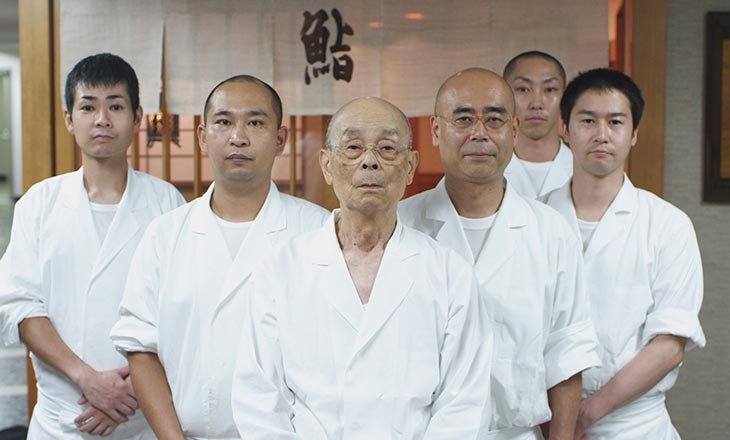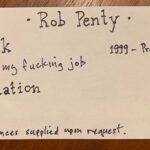Early in the documentary, sushi chef Jiro Ono states his philosophy clearly.
“Once you decide on your occupation you must immerse yourself in your work. You have to fall in love with your work. Never complain about your job. You must dedicate your life to mastering your skill. That’s the secret of success and is the key to being regarded honorably.”
We follow him on the train in the morning on his way to work, the way that he has been doing it every day for decades upon decades. He is a shokunin, which is a Japanese word literally translated to artisan or crafstman but it appears to be deeper than that. There seems to be an element of purpose and practice that goes along with being a shokunin. The idea of repeating the same thing every day is a persistent theme.
As Jiro’s former apprentice Mizutani says, “He just works relentlessly every day. That’s how shokunin are. The way of the shokunin is to repeat the same thing every day. They just want to work. They aren’t trying to be special.”
Yoshikazu, Jiro’s oldest son who at 50 still hasn’t taken over the restaurant, says, “We’re not trying to be exclusive or elite. The techniques we use are no big secret. It really comes down to making an effort and repeating the same thing every day… In this line of business if you work hard you’ll get good over time. But if you want to reach the next level you need talent. The rest depends on how hard you work.”
While Jiro as a shokunin is a very Japanese ideal, he is also a self made man in the western tradition. He left home at seven (seven!) and found his way to an apprenticeship as a sushi chef working his way to the top, becoming arguably the best sushi chef in the world. His restaurant received three Michelin stars which means, as stated in the documentary, that it’s worth visiting a country just for that restaurant.
There is still a simplicity and an honor to the way he goes about his work. His restaurant is world class but it is located underground by a train station. Apprentices come to him to learn to become sushi chefs. They begin by preparing the hot towels for customers. Then they can learn to prepare fish (including massaging octopus for forty-five minutes). If they do well at that, after ten years (ten!) they are able to prepare the egg sushi.
I was blown away by the dedication to this craft. Even the vendors in the fish market took their craft seriously. I’ve never been that wholly committed to anything in my life.
I think often about work (see here and here). I lament not having worked harder in my life. I regret not going for an advanced degree and I have this pesky notion that I should have been a doctor or a lawyer regardless of the fact that neither profession appeals to me.
Nakazawa, a senior apprentice, prepared the eggs two hundred times before doing it right. I’ve never attempted and failed at anything that I love to do two hundred times. Shouldn’t I have by now?
Jiro’s younger son Takashi started his own restaurant and Jiro said, “Now you have no home to come back to.” He was telling his son to go out and make it on his own and make no excuses. Jiro then said, “Nowadays parents tell their children, ‘you can return if it doesn’t work out.’ When parents say stupid things like that, the kids turn out to be failures.” That’s how I often feel about myself, that I have failed. I never chose a practice and dedicated myself to it.
Looking back at his own life and wondering what advice to give to young students he wanted to say, “Studying hard doesn’t guarantee that you will be a respectable person,” and, “Always doing what you are told doesn’t mean you’ll succeed in life.” As someone who always studied hard and followed the rules thinking that that was the key to everything, those words gave me pause.
Roger Ebert wasn’t as impressed with Jiro and his life philosophy calling this a portrait of tunnel vision. This could be true. We spend considerable time with his sons – each a sushi chef – but their mother is only shown in a few photos. He even admits that he wasn’t much of a father. Does Jiro have friends? Does he enjoy anything else?
But I’m not choosing to look at him as a tragedy of a self-critical perfectionism. I’m seeing him as an extreme example of commitment.
I have skills that I respect and hope to master. I could dedicate myself more to improv and storytelling and even web development. Writing in this blog is my own attempt to be a shokunin, returning to the practice of writing these short essays to try to get better.
The documentary leaves us with the words of Yoshikazu, who it is revealed is the chef that made the sushi that earned the restaurant its Michelin stars, speaking about his father, “Always look ahead and above yourself. Always try to improve on yourself. Always strive to elevate you craft. That’s what he taught me.”




